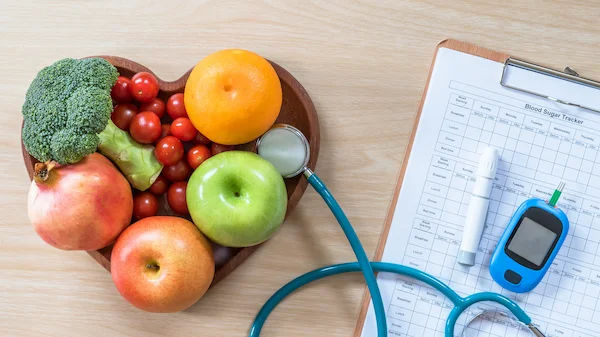Is Orange Good for Diabetes?
Wondering if oranges are good for diabetes? Discover their impact on blood sugar levels, health benefits, and how to include them in a diabetic-friendly diet.

Written by Dr Sonia Bhatt
Last updated on 3rd Jul, 2025
Diabetes is a chronic health condition that affects how the body converts food into energy. There are different types of diabetes, with type 1 and type 2 being the most common. In diabetes, the body either doesn’t produce enough insulin or can't use it effectively, leading to elevated blood sugar levels. Over time, high blood sugar can cause damage to organs such as the heart, kidneys, eyes, and nerves. Managing blood sugar levels is essential to preventing complications and maintaining overall health.
When it comes to dietary choices, people with diabetes must be cautious, as certain foods can cause blood sugar spikes. Among the many fruits suitable for a diabetes-friendly diet, oranges are often considered a healthy option.
If you have diabetes, you may wonder, "Is orange good for diabetes?" The short answer is yes—when consumed in moderation, oranges can be a nutritious and beneficial addition to your diet. In this article, we’ll explore the health benefits of oranges for people with diabetes and provide tips on how to incorporate them into a balanced meal plan.
Nutritional Profile of Oranges
Oranges are packed with vitamins, minerals, and antioxidants, making them a nutritious choice for most people, including those with diabetes. A medium-sized orange (approximately 140 grams) typically contains:
Calories: 60–70 kcal
Carbohydrates: 15–18 grams
Fiber: 2–3 grams
Sugars: 12 grams
Vitamin C: 82 mg (92% of the Daily Value)
Folate: 30 µg (9% of the Daily Value)
Magnesium: 15 mg (5% of the Daily Value)
Calcium: 50–60 mg (6% of the Daily Value)
Potassium: 232 mg
Oranges are low in calories, making them a great fruit choice for those managing their weight or blood sugar levels.
Benefits of Oranges for People with Diabetes
Incorporating oranges into a diabetes-friendly diet can offer several health benefits. Below are key reasons why oranges can be a valuable part of your meal plan:
Rich in Vitamin C
Oranges are an excellent source of vitamin C, which is important for immune function, skin health, and wound healing. Since diabetes can increase the risk of infections, maintaining a strong immune system is particularly important for people with this condition.
Low Glycemic Index
The glycemic index (GI) measures how quickly a food raises blood sugar levels. Foods with a low GI are preferred for people with diabetes because they cause a slower and more gradual rise in blood sugar. Oranges have a low GI of 43, making them suitable for blood sugar management.
High in Fiber
Oranges contain both soluble and insoluble fibre, which help slow the absorption of sugar into the bloodstream. This can help prevent sharp spikes in blood sugar. Fibre also supports digestive health and can help manage cholesterol, which is particularly beneficial for people with diabetes who are at increased risk of heart disease.
Antioxidant Properties
Oranges are rich in antioxidants such as flavonoids and carotenoids, which can help reduce oxidative stress and inflammation. This is important for people with diabetes, as chronic inflammation is linked to complications like cardiovascular disease and nerve damage.
Hydration
With a water content of approximately 86%, oranges are great for hydration. Proper hydration is crucial for managing blood sugar levels and supporting kidney function.
Tips for Including Oranges in a Diabetes-Friendly Diet
While oranges offer several health benefits, it's important to include them in your diet in a way that supports blood sugar control. Here are some practical tips for enjoying oranges mindfully:
Pair with Protein or Healthy Fats: To help stabilise blood sugar levels, pair your orange with a protein or healthy fats source. For example, try combining an orange with a handful of almonds, a small serving of greek yoghurt, or a slice of cheese. This combination can slow the absorption of sugar and help you feel fuller for longer.
Opt for Whole Oranges Over Orange Juice: Whole oranges contain fibre, which helps regulate blood sugar levels. On the other hand, orange juice lacks fibre and can cause quicker spikes in blood sugar. If you prefer orange juice, choose a freshly squeezed, no-sugar-added version, but consume it in moderation.
Use in Salads and Snacks: Oranges can be a flavorful addition to salads, smoothies, or even savoury dishes. Adding orange segments to a salad can enhance the flavour while keeping your meal nutritious.
Watch for Added Sugars: When consuming packaged products like dried oranges or flavoured snacks, be mindful of added sugars. These can significantly increase the carbohydrate content and affect blood sugar levels.
Monitor Portion Sizes: While oranges are low in calories and sugar, portion control is important. One medium-sized orange is typically one serving. Be mindful of your total carbohydrate intake to maintain blood sugar control.
How Oranges Affect Blood Sugar
The natural sugars in oranges are balanced by their fibre content, which leads to a gradual release of glucose into the bloodstream. This makes oranges a safer fruit option for people with diabetes compared to higher-sugar fruits like bananas or grapes. However, the method of consumption matters. Whole oranges are preferable to orange juice, which lacks fibre and can cause blood sugar spikes.
How Oranges Compare to Other Fruits for Blood Sugar Control
When managing diabetes, understanding the glycemic index (GI) and glycemic load (GL) of various fruits can help guide food choices. The GI measures how quickly a food raises blood sugar, while the GL takes into account both the GI and the amount of carbohydrates in a serving of food. While oranges are a low-GI fruit, it's helpful to compare them with other commonly consumed fruits to understand their impact on blood sugar levels.
Here’s how oranges are preferable to some other fruits in terms of GI and GL:
| Fruit | Glycemic Index (GI) | Glycemic Load (GL) | Key Nutrients | Impact on Blood Sugar |
| Oranges | 40-45 (Low) | 3-5 (Low) | Vitamin C, fibre, folate, potassium | It causes a slow, moderate rise in blood sugar, making them suitable for individuals with diabetes. |
| Bananas | 51-55 (Medium) | 10-12 (Medium) | Potassium, vitamin B6, vitamin C, fiber | Higher GI leads to quicker increases in blood sugar levels. |
| Watermelon | 72 (High) | 4 per 100g (Low) | Vitamin C, vitamin A, hydration | High GI causes rapid increases in blood sugar, but its low GL makes it a less significant impact. |
| Apples | 36-40 (Low) | 6-7 (Low) | Fiber, vitamin C, potassium | Low to moderate GI, causing gradual increases in blood sugar levels. |
| Grapes | 53 (Medium) | 8-9 (Medium) | Vitamin C, vitamin K, antioxidants | Moderate rise in blood sugar levels, higher than oranges, due to medium GI. |
| Pineapple | 59 (Medium) | 7-8 (Medium) | Vitamin C, manganese, fibre | Causes a moderate increase in blood sugar levels, higher than oranges due to medium GI. |
Are There Any Risks or Precautions?
For most people with diabetes, consuming oranges in moderation is safe. However, if you have citrus allergies or certain gastrointestinal issues (like acid reflux), you may need to limit or avoid oranges. As with all foods, it’s essential to monitor your blood sugar levels and consult your healthcare provider if you have concerns about how oranges or other fruits affect your diabetes management.
Conclusion
Oranges can be a beneficial addition to a diabetes-friendly diet due to their low glycemic index, rich nutrient content, and health benefits. They help manage blood sugar levels, provide antioxidants, support heart health, and offer a refreshing, nutritious option for people with diabetes. By incorporating whole oranges into a balanced diet, practising portion control, and pairing them with other nutrient-dense foods, you can enjoy their many health benefits while keeping your blood sugar in check.
Consult Top Endocrinologist
Consult Top Endocrinologist

Dr. Nithin Reddy Modhugu
Endocrinologist
6 Years • MBBS, MD (General Medicine), DNB (Endocrinology)
Hyderabad
Dr. Nithin's Endocrine Clinic, Hyderabad
(100+ Patients)

Dr. Gayatri S
Endocrinologist
4 Years • Suggested Qualifictaion- MBBS, MD (Internal Medicine), DM (ENDOCRINOLOGY)
Nellore
Narayana hospital, Nellore

Dr. Shiva Madan
Endocrinologist
10 Years • MBBS , MD (General medicine) , DM (Endocrinology)
Bikaner
Sushma diabetes and Endocrine center, Bikaner

Dr. Venkata Rakesh Chintala
Endocrinologist
8 Years • MBBS,MD( GEN MEDICINE), DM ( ENDOCRINOLOGY)
Krishna district
Sanjeevani Hospital, Krishna district

Dr. Arunava Ghosh
General Physician/ Internal Medicine Specialist
9 Years • MBBS,MD(GENL.MED.),DM(ENDOCRINOLOGY)
Kolkata
VDC Clinic, Kolkata


